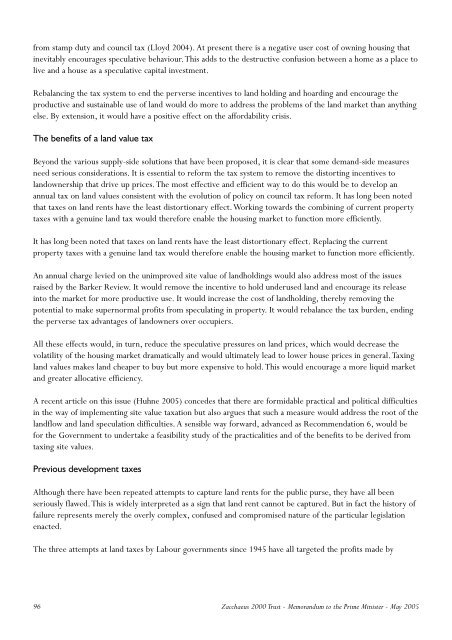Memorandum-to-the-Prime-Minister-on-Unaffordable-Housing
Memorandum-to-the-Prime-Minister-on-Unaffordable-Housing
Memorandum-to-the-Prime-Minister-on-Unaffordable-Housing
Create successful ePaper yourself
Turn your PDF publications into a flip-book with our unique Google optimized e-Paper software.
from stamp duty and council tax (Lloyd 2004). At present <str<strong>on</strong>g>the</str<strong>on</strong>g>re is a negative user cost of owning housing that<br />
inevitably encourages speculative behaviour.This adds <str<strong>on</strong>g>to</str<strong>on</strong>g> <str<strong>on</strong>g>the</str<strong>on</strong>g> destructive c<strong>on</strong>fusi<strong>on</strong> between a home as a place <str<strong>on</strong>g>to</str<strong>on</strong>g><br />
live and a house as a speculative capital investment.<br />
Rebalancing <str<strong>on</strong>g>the</str<strong>on</strong>g> tax system <str<strong>on</strong>g>to</str<strong>on</strong>g> end <str<strong>on</strong>g>the</str<strong>on</strong>g> perverse incentives <str<strong>on</strong>g>to</str<strong>on</strong>g> land holding and hoarding and encourage <str<strong>on</strong>g>the</str<strong>on</strong>g><br />
productive and sustainable use of land would do more <str<strong>on</strong>g>to</str<strong>on</strong>g> address <str<strong>on</strong>g>the</str<strong>on</strong>g> problems of <str<strong>on</strong>g>the</str<strong>on</strong>g> land market than anything<br />
else. By extensi<strong>on</strong>, it would have a positive effect <strong>on</strong> <str<strong>on</strong>g>the</str<strong>on</strong>g> affordability crisis.<br />
The benefits of a land value tax<br />
Bey<strong>on</strong>d <str<strong>on</strong>g>the</str<strong>on</strong>g> various supply-side soluti<strong>on</strong>s that have been proposed, it is clear that some demand-side measures<br />
need serious c<strong>on</strong>siderati<strong>on</strong>s. It is essential <str<strong>on</strong>g>to</str<strong>on</strong>g> reform <str<strong>on</strong>g>the</str<strong>on</strong>g> tax system <str<strong>on</strong>g>to</str<strong>on</strong>g> remove <str<strong>on</strong>g>the</str<strong>on</strong>g> dis<str<strong>on</strong>g>to</str<strong>on</strong>g>rting incentives <str<strong>on</strong>g>to</str<strong>on</strong>g><br />
landownership that drive up prices.The most effective and efficient way <str<strong>on</strong>g>to</str<strong>on</strong>g> do this would be <str<strong>on</strong>g>to</str<strong>on</strong>g> develop an<br />
annual tax <strong>on</strong> land values c<strong>on</strong>sistent with <str<strong>on</strong>g>the</str<strong>on</strong>g> evoluti<strong>on</strong> of policy <strong>on</strong> council tax reform. It has l<strong>on</strong>g been noted<br />
that taxes <strong>on</strong> land rents have <str<strong>on</strong>g>the</str<strong>on</strong>g> least dis<str<strong>on</strong>g>to</str<strong>on</strong>g>rti<strong>on</strong>ary effect.Working <str<strong>on</strong>g>to</str<strong>on</strong>g>wards <str<strong>on</strong>g>the</str<strong>on</strong>g> combining of current property<br />
taxes with a genuine land tax would <str<strong>on</strong>g>the</str<strong>on</strong>g>refore enable <str<strong>on</strong>g>the</str<strong>on</strong>g> housing market <str<strong>on</strong>g>to</str<strong>on</strong>g> functi<strong>on</strong> more efficiently.<br />
It has l<strong>on</strong>g been noted that taxes <strong>on</strong> land rents have <str<strong>on</strong>g>the</str<strong>on</strong>g> least dis<str<strong>on</strong>g>to</str<strong>on</strong>g>rti<strong>on</strong>ary effect. Replacing <str<strong>on</strong>g>the</str<strong>on</strong>g> current<br />
property taxes with a genuine land tax would <str<strong>on</strong>g>the</str<strong>on</strong>g>refore enable <str<strong>on</strong>g>the</str<strong>on</strong>g> housing market <str<strong>on</strong>g>to</str<strong>on</strong>g> functi<strong>on</strong> more efficiently.<br />
An annual charge levied <strong>on</strong> <str<strong>on</strong>g>the</str<strong>on</strong>g> unimproved site value of landholdings would also address most of <str<strong>on</strong>g>the</str<strong>on</strong>g> issues<br />
raised by <str<strong>on</strong>g>the</str<strong>on</strong>g> Barker Review. It would remove <str<strong>on</strong>g>the</str<strong>on</strong>g> incentive <str<strong>on</strong>g>to</str<strong>on</strong>g> hold underused land and encourage its release<br />
in<str<strong>on</strong>g>to</str<strong>on</strong>g> <str<strong>on</strong>g>the</str<strong>on</strong>g> market for more productive use. It would increase <str<strong>on</strong>g>the</str<strong>on</strong>g> cost of landholding, <str<strong>on</strong>g>the</str<strong>on</strong>g>reby removing <str<strong>on</strong>g>the</str<strong>on</strong>g><br />
potential <str<strong>on</strong>g>to</str<strong>on</strong>g> make supernormal profits from speculating in property. It would rebalance <str<strong>on</strong>g>the</str<strong>on</strong>g> tax burden, ending<br />
<str<strong>on</strong>g>the</str<strong>on</strong>g> perverse tax advantages of landowners over occupiers.<br />
All <str<strong>on</strong>g>the</str<strong>on</strong>g>se effects would, in turn, reduce <str<strong>on</strong>g>the</str<strong>on</strong>g> speculative pressures <strong>on</strong> land prices, which would decrease <str<strong>on</strong>g>the</str<strong>on</strong>g><br />
volatility of <str<strong>on</strong>g>the</str<strong>on</strong>g> housing market dramatically and would ultimately lead <str<strong>on</strong>g>to</str<strong>on</strong>g> lower house prices in general.Taxing<br />
land values makes land cheaper <str<strong>on</strong>g>to</str<strong>on</strong>g> buy but more expensive <str<strong>on</strong>g>to</str<strong>on</strong>g> hold.This would encourage a more liquid market<br />
and greater allocative efficiency.<br />
A recent article <strong>on</strong> this issue (Huhne 2005) c<strong>on</strong>cedes that <str<strong>on</strong>g>the</str<strong>on</strong>g>re are formidable practical and political difficulties<br />
in <str<strong>on</strong>g>the</str<strong>on</strong>g> way of implementing site value taxati<strong>on</strong> but also argues that such a measure would address <str<strong>on</strong>g>the</str<strong>on</strong>g> root of <str<strong>on</strong>g>the</str<strong>on</strong>g><br />
landflow and land speculati<strong>on</strong> difficulties. A sensible way forward, advanced as Recommendati<strong>on</strong> 6, would be<br />
for <str<strong>on</strong>g>the</str<strong>on</strong>g> Government <str<strong>on</strong>g>to</str<strong>on</strong>g> undertake a feasibility study of <str<strong>on</strong>g>the</str<strong>on</strong>g> practicalities and of <str<strong>on</strong>g>the</str<strong>on</strong>g> benefits <str<strong>on</strong>g>to</str<strong>on</strong>g> be derived from<br />
taxing site values.<br />
Previous development taxes<br />
Although <str<strong>on</strong>g>the</str<strong>on</strong>g>re have been repeated attempts <str<strong>on</strong>g>to</str<strong>on</strong>g> capture land rents for <str<strong>on</strong>g>the</str<strong>on</strong>g> public purse, <str<strong>on</strong>g>the</str<strong>on</strong>g>y have all been<br />
seriously flawed.This is widely interpreted as a sign that land rent cannot be captured. But in fact <str<strong>on</strong>g>the</str<strong>on</strong>g> his<str<strong>on</strong>g>to</str<strong>on</strong>g>ry of<br />
failure represents merely <str<strong>on</strong>g>the</str<strong>on</strong>g> overly complex, c<strong>on</strong>fused and compromised nature of <str<strong>on</strong>g>the</str<strong>on</strong>g> particular legislati<strong>on</strong><br />
enacted.<br />
The three attempts at land taxes by Labour governments since 1945 have all targeted <str<strong>on</strong>g>the</str<strong>on</strong>g> profits made by<br />
96<br />
Zacchaeus 2000 Trust - <str<strong>on</strong>g>Memorandum</str<strong>on</strong>g> <str<strong>on</strong>g>to</str<strong>on</strong>g> <str<strong>on</strong>g>the</str<strong>on</strong>g> <str<strong>on</strong>g>Prime</str<strong>on</strong>g> <str<strong>on</strong>g>Minister</str<strong>on</strong>g> - May 2005


